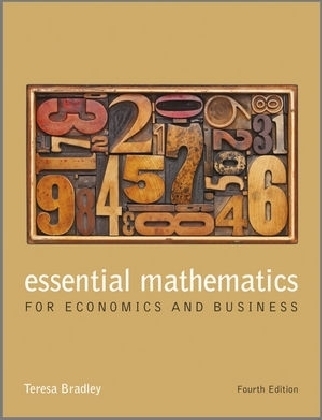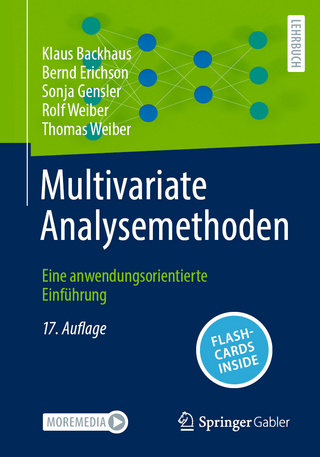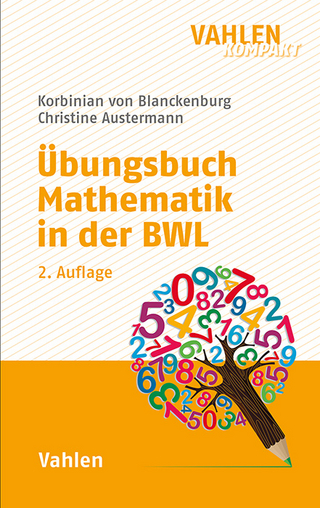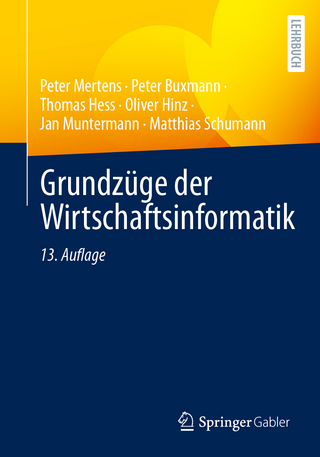
Essential Mathematics for Economics and Business
John Wiley & Sons Inc (Verlag)
978-1-118-35829-0 (ISBN)
Now 4 colour and includes an outstanding resources suite!
Essential Mathematics for Economics and Business is established as one of the leading introductory textbooks for non maths specialists taking economics and business degrees.
The fundamental mathematical concepts are explained as simply and briefly as possible, using a wide selection of worked examples, graphs and real-world applications. It combines a non-rigorous approach to mathematics with applications in economics and business.
'The text is aimed at providing an introductory-level exposition of mathematical methods for economics and business students. In terms of level, pace, complexity of examples and user-friendly style the text is excellent - it genuinely recognises and meets the needs of students with minimal maths background.'
Colin Glass, Emeritus Professor, University of Ulster
'One of the major strengths of this book is the range of exercises in both drill and applications. Also the "worked examples" are excellent; they provide examples of the use of mathematics to realistic problems and are easy to follow'
Donal Hurley, formerly of University College Cork
‘The most comprehensive reader in this topic yet, this book is an essential aid to the avid economist who loathes mathematics!’
Amazon.co.uk
Until 2012, Teresa Bradley lectured in mathematics and statistics at Limerick Institute of Technology, and has been involved for many years with the University of London on the external Diploma in Economics as well as the BSc in Economics, Business and Management. Teresa Bradley is also author of Essential Statistics for Economics, Business and Management, published by John Wiley & Sons, Ltd.
Introduction xiii
Chapter 1
Mathematical Preliminaries 1
1.1 Some Mathematical Preliminaries 2
1.2 Arithmetic Operations 3
1.3 Fractions 6
1.4 Solving Equations 11
1.5 Currency Conversions 14
1.6 Simple Inequalities 18
1.7 Calculating Percentages 21
1.8 The Calculator. Evaluation and Transposition of Formulae 24
1.9 Introducing Excel 28
Chapter 2
The Straight Line and Applications 37
2.1 The Straight Line 38
2.2 Mathematical Modelling 54
2.3 Applications: Demand, Supply, Cost, Revenue 59
2.4 More Mathematics on the Straight Line 76
2.5 Translations of Linear Functions 82
2.6 Elasticity of Demand, Supply and Income 83
2.7 Budget and Cost Constraints 91
2.8 Excel for Linear Functions 92
2.9 Summary 97
Chapter 3
Simultaneous Equations 101
3.1 Solving Simultaneous Linear Equations 102
3.2 Equilibrium and Break-even 111
3.3 Consumer and Producer Surplus 128
3.4 The National Income Model and the IS-LM Model 133
3.5 Excel for Simultaneous Linear Equations 137
3.6 Summary 142
Appendix 143
Chapter 4
Non-linear Functions and Applications 147
4.1 Quadratic, Cubic and Other Polynomial Functions 148
4.2 Exponential Functions 170
4.3 Logarithmic Functions 184
4.4 Hyperbolic (Rational) Functions of the Form a/(bx + c) 197
4.5 Excel for Non-linear Functions 202
4.6 Summary 205
Chapter 5
Financial Mathematics 209
5.1 Arithmetic and Geometric Sequences and Series 210
5.2 Simple Interest, Compound Interest and Annual Percentage Rates 218
5.3 Depreciation 228
5.4 Net Present Value and Internal Rate of Return 230
5.5 Annuities, Debt Repayments, Sinking Funds 236
5.6 The Relationship between Interest Rates and the Price of Bonds 248
5.7 Excel for Financial Mathematics 251
5.8 Summary 254
Appendix 256
Chapter 6
Differentiation and Applications 259
6.1 Slope of a Curve and Differentiation 260
6.2 Applications of Differentiation, Marginal Functions, Average Functions 270
6.3 Optimisation for Functions of One Variable 286
6.4 Economic Applications of Maximum and Minimum Points 304
6.5 Curvature and Other Applications 320
6.6 Further Differentiation and Applications 334
6.7 Elasticity and the Derivative 347
6.8 Summary 357
Chapter 7
Functions of Several Variables 361
7.1 Partial Differentiation 362
7.2 Applications of Partial Differentiation 380
7.3 Unconstrained Optimisation 400
7.4 Constrained Optimisation and Lagrange Multipliers 410
7.5 Summary 422
Chapter 8
Integration and Applications 427
8.1 Integration as the Reverse of Differentiation 428
8.2 The Power Rule for Integration 429
8.3 Integration of the Natural Exponential Function 435
8.4 Integration by Algebraic Substitution 436
8.5 The Definite Integral and the Area under a Curve 441
8.6 Consumer and Producer Surplus 448
8.7 First-order Differential Equations and Applications 456
8.8 Differential Equations for Limited and Unlimited Growth 468
8.9 Integration by Substitution and Integration by Parts website only
8.10 Summary 474
Chapter 9
Linear Algebra and Applications 477
9.1 Linear Programming 478
9.2 Matrices 488
9.3 Solution of Equations: Elimination Methods 498
9.4 Determinants 504
9.5 The Inverse Matrix and Input/Output Analysis 518
9.6 Excel for Linear Algebra 531
9.7 Summary 534
Chapter 10
Difference Equations 539
10.1 Introduction to Difference Equations 540
10.2 Solution of Difference Equations (First-order) 542
10.3 Applications of Difference Equations (First-order) 554
10.4 Summary 564
Solutions to Progress Exercises 567
Worked Examples 653
Index 659
| Erscheint lt. Verlag | 6.5.2013 |
|---|---|
| Verlagsort | New York |
| Sprache | englisch |
| Maße | 191 x 246 mm |
| Gewicht | 1474 g |
| Themenwelt | Mathematik / Informatik ► Mathematik ► Finanz- / Wirtschaftsmathematik |
| Wirtschaft ► Volkswirtschaftslehre ► Ökonometrie | |
| ISBN-10 | 1-118-35829-5 / 1118358295 |
| ISBN-13 | 978-1-118-35829-0 / 9781118358290 |
| Zustand | Neuware |
| Informationen gemäß Produktsicherheitsverordnung (GPSR) | |
| Haben Sie eine Frage zum Produkt? |
aus dem Bereich


